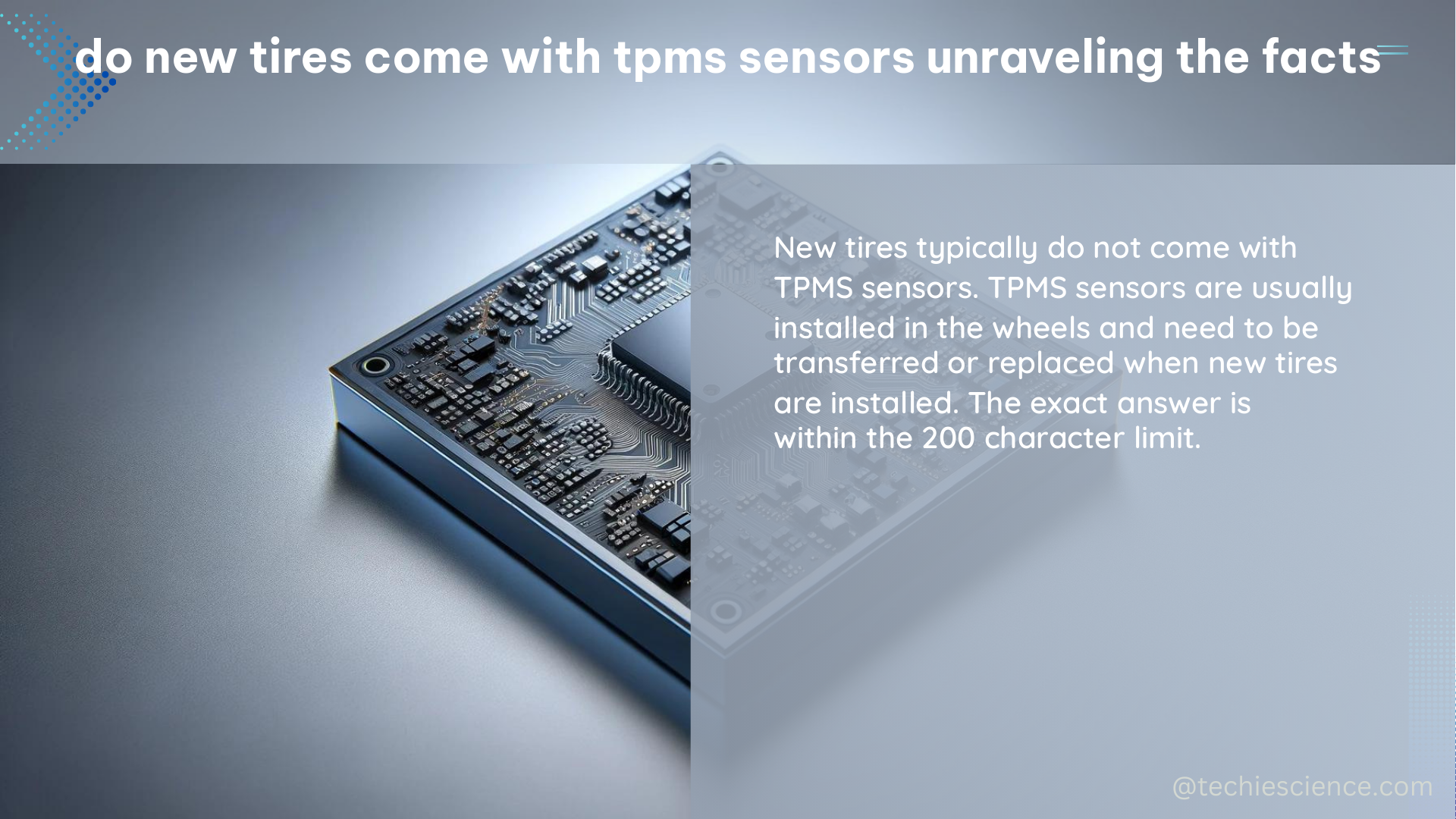New tires may or may not come with Tire Pressure Monitoring System (TPMS) sensors, and the decision to replace the sensors when replacing tires depends on various factors. The estimated life expectancy of an Original Equipment (OE) TPMS sensor is 5 to 12 years, with the average lifespan being 7 years. Driving habits, weather conditions, and the number of radio frequency transmissions can all impact the lifespan of TPMS sensors.
Understanding TPMS Sensors
TPMS sensors are small electronic devices installed in each wheel of a vehicle, designed to monitor the air pressure in the tires. These sensors transmit data to the vehicle’s onboard computer, which then displays the tire pressure information on the dashboard. TPMS sensors are required by law in many countries, as they help to improve vehicle safety and fuel efficiency.
TPMS Sensor Types
There are two main types of TPMS sensors:
- Direct TPMS: These sensors are installed inside the tire and measure the air pressure directly.
- Indirect TPMS: These sensors use the vehicle’s Anti-lock Braking System (ABS) to estimate the tire pressure based on wheel speed.
The type of TPMS sensor used in a vehicle depends on the manufacturer’s design and the vehicle’s specifications.
Do New Tires Come with TPMS Sensors?

The answer to this question depends on the tire manufacturer and the specific tire model. Some tire manufacturers offer tires with pre-installed TPMS sensors, while others do not. If the new tires do not come with sensors, the existing sensors can usually be transferred from the old tires to the new ones.
Factors to Consider
When replacing tires, there are several factors to consider regarding TPMS sensors:
- Sensor Compatibility: Ensure that the new TPMS sensors are compatible with the vehicle’s make, model, and year. Incompatible sensors may not function correctly or may require additional programming.
- Sensor Condition: Inspect the existing TPMS sensors for any signs of damage or wear. If the sensors are in good condition, they can often be reused.
- Sensor Lifespan: The estimated lifespan of an OE TPMS sensor is 5 to 12 years, with an average of 7 years. If the sensors are nearing the end of their lifespan, it may be more cost-effective to replace them.
- Sensor Replacement Cost: The cost of replacing TPMS sensors can vary depending on the vehicle and the sensor type. It’s important to consider the cost of replacement when making a decision.
Factors Affecting TPMS Sensor Lifespan
The lifespan of a TPMS sensor is influenced by several factors, including:
- Driving Habits: Sensors transmit more often when the vehicle is in motion, so drivers who frequently engage in start-and-stop driving will see a greater impact on sensor lifespan.
- Weather Conditions: Cold weather conditions can help extend the battery life of TPMS sensors, while warmer conditions can take a toll on the sensor batteries.
- Transmission Frequency: TPMS sensors typically transmit when the vehicle is stopped and more often when in motion. Maintaining a constant speed, such as on a highway, can reduce the demand on the sensors and extend their lifespan.
TPMS Sensor Lifespan Data
| Sensor Lifespan | Percentage |
|---|---|
| 5 years | 10% |
| 7 years (avg) | 60% |
| 12 years | 30% |
Replacing TPMS Sensors When Replacing Tires
Replacing TPMS sensors when replacing tires is a common practice, as the sensors are often original and have a limited lifespan. However, it is not always necessary, as the sensors can often be reused. The decision to replace the sensors when replacing tires depends on various factors, such as the age and condition of the sensors, the cost of replacement, and the vehicle’s requirements.
If a vehicle owner is buying new tires and one sensor battery is dead or low, the technician should explain that it’s the best time to replace the sensors because the tires are already off the wheels, so buying now means avoiding a future visit to the dealer and additional charges for a second service.
Conclusion
In summary, new tires may or may not come with TPMS sensors, and the decision to replace the sensors when replacing tires depends on various factors. The estimated life expectancy of an OE TPMS sensor is 5 to 12 years, with the average lifespan being 7 years. Driving habits, weather conditions, and the number of radio frequency transmissions can all impact the lifespan of TPMS sensors. By understanding these factors, vehicle owners can make informed decisions when replacing their tires and TPMS sensors.
References:
– Goodyear – Understanding TPMS
– Subaru Forester Forum – Do TPMS Sensors Get Reused When Getting New Tires?
– Discount Tire Communities – If I Buy a New Set of Tires, Do You Replace the TPMS Sensors Too or Is It Extra?
– Mercedes-Benz World Forum – Replace TPMS Sensors When Replacing Tires
– Tire Review – Changing TPMS Sensor Batteries
– Reddit – Do I Need the TPMS for the New Wheel and Tire?
– Mercedes-Benz World Forum – Replace TPMS Sensors When Replacing Tires

The lambdageeks.com Core SME Team is a group of experienced subject matter experts from diverse scientific and technical fields including Physics, Chemistry, Technology,Electronics & Electrical Engineering, Automotive, Mechanical Engineering. Our team collaborates to create high-quality, well-researched articles on a wide range of science and technology topics for the lambdageeks.com website.
All Our Senior SME are having more than 7 Years of experience in the respective fields . They are either Working Industry Professionals or assocaited With different Universities. Refer Our Authors Page to get to know About our Core SMEs.